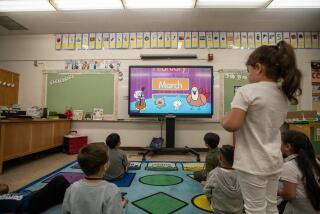Importance of Early Grades
- Share via
Re “Focus on Early Grades Is Key, Educators Say,” Nov. 1:
Hooray! So glad that educators have newly discovered the early grades are the key. “It requires more skill to teach an infant school than to occupy a chair of moral philosophy in a great college”--William H. McGuffey, 1868.
Now if we really want better teachers and upgraded quality in those grades, we can start paying those most important teachers at the level of college teachers. Kids learn in kindergarten (or preschool) whether they like school, and whether school likes them. They are checking out whether learning in school is interesting or tedious. They are discovering whether as students they will be successful or failures. Let’s invest in prevention of dropouts at this fertile milestone moment in time.
JUNE PAYNE
Pacific Palisades
* I find this report interesting for a number of reasons. That it has taken these non-classroom experts all these years to discover that the K-3 years are the most important in a student’s lifelong learning performance is disturbing. This insight has never been a mystery for classroom teachers in basic policy-making.
The fundamental instruction problem in K-3 is class size. The “best we have” will experience limited success if they continue to be faced with class sizes that compromise their instructional talents. The enthusiasm that most kids have when leaving for their first day of school is soon lost by the many who fall through the cracks in the K-3 years because of large class sizes. The adventure is gone and many of them become underachievers and discipline problems. The solution is to limit class size in grades K-3 to no more than 15 students per class.
Until those responsible for educational policy are able to understand that K-3 class size is the problem, all the money spent on innovative projects and the demand for teacher accountability will do little to improve the educational experiences of our children.
EARLE ROSSNEY
Temecula
* In the “first-ever joint meeting of the State Board of Education, the Community Colleges Board of Governors and the CSU Board of Trustees” it was concluded that the education establishment “must do a better job of letting the public know what is expected.” They’re going to let us know? Gee, thanks.
It struck me as odd when your article noted that one voice was absent at the meeting of California educators, the University of California Board of Regents. Only one voice? I would have liked to have heard more from the students and from their parents.
CINDY COTTER
Whittier






